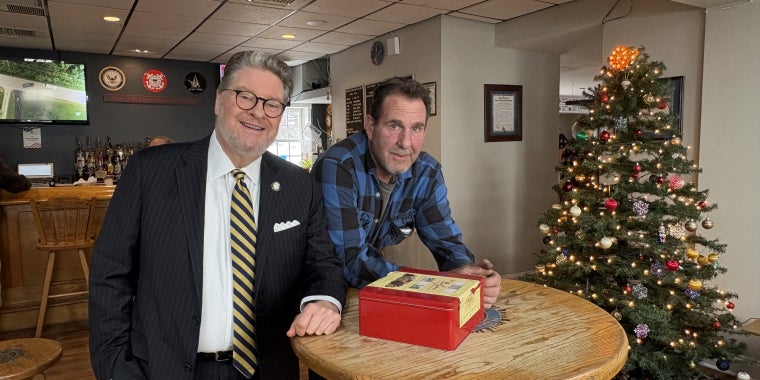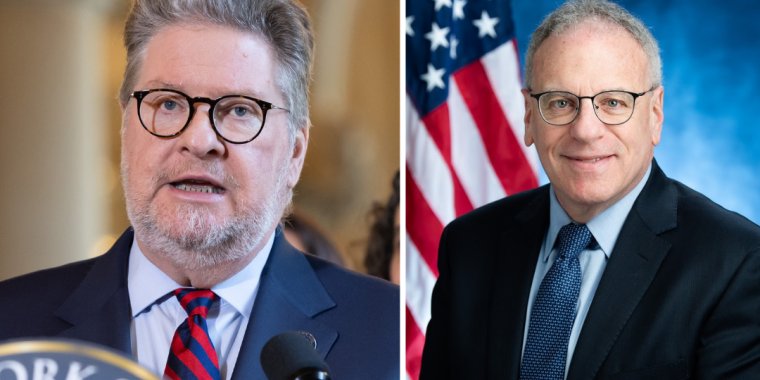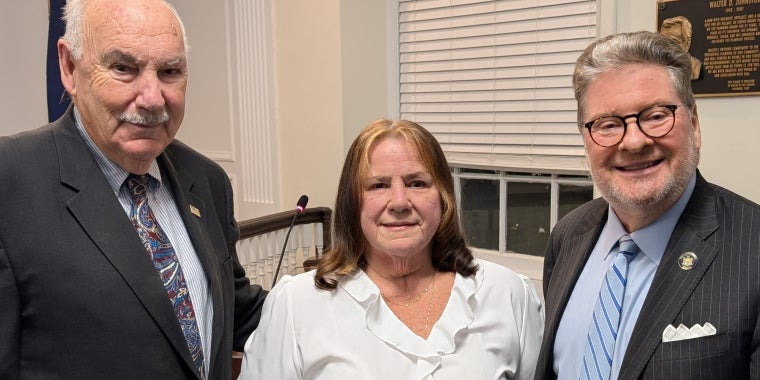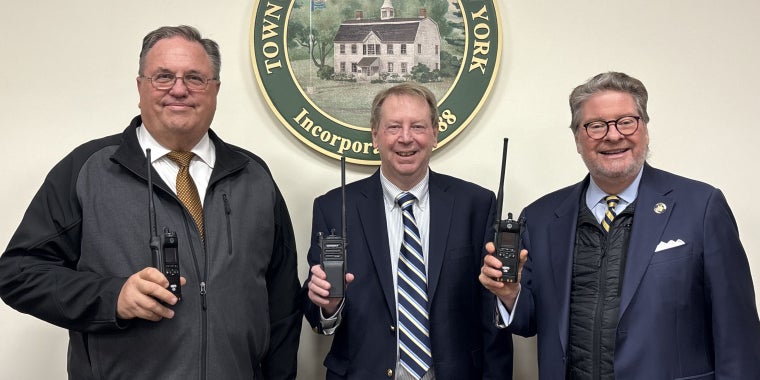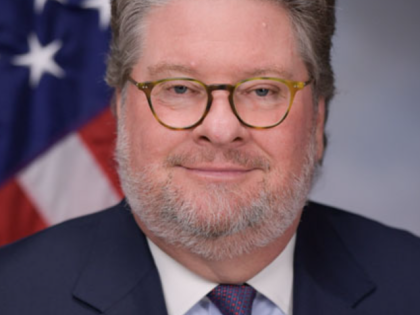
Harckham, Advocates Announce New Bill to Spur Zero-Emission Vehicle Sales in New York
February 12, 2024
-
ISSUE:
- Senator Harckham. SD40
- Zero-emissions Vehicles
- CLCPA; clean energy mandates
- Electric Vehicles
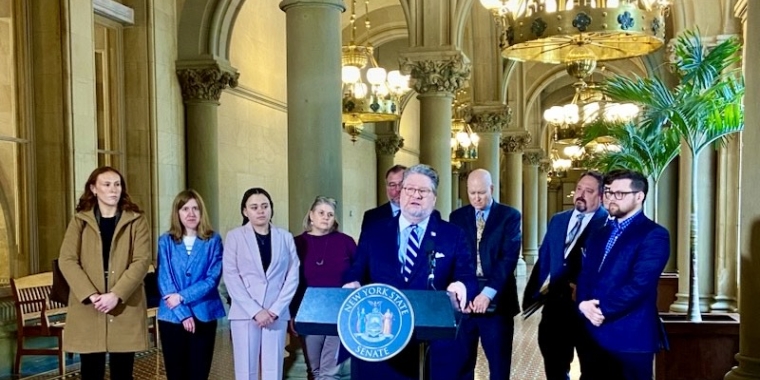
State Sen. Pete Harckham and environmental advocates at zero-emissions vehicle sales press conference in Albany at the State Capitol
Albany, NY – New York State Senator Pete Harckham and advocates from several prominent environmental groups announced today new legislation designed to increase sales of zero-emission vehicles (ZEVs) statewide if predetermined sales targets are not met.
New York is currently falling short of its goal of all new passenger cars and trucks sold statewide New York to be zero emissions by 2035. Harckham’s new bill (S.7767) follows the recommendations of the Climate Action Scoping Plan to increase the availability of ZEVs by expanding direct-to-consumer sales by manufacturers of ZEVs if the current system of car dealerships cannot show that 35% of vehicle sales are ZEVs by 2026 or 68% by 2028.
“There are many compelling reasons to support legislation aimed at increasing sales of zero-emission vehicle sales, including the severe effects of climate change we are now experiencing, public health problems related to air pollution and the simple fact that fossil fuel combustion is not a cost-effective way to power our vehicles,” said Harckham. “In order to meet the carbon-free, reduced greenhouse gas emissions goals of the Climate Leadership and Community Protection Act, we need to create a defined goal model of increased sales of new zero-emission vehicle sales in New York.”
Assemblymember Michaelle C. Solages, who is sponsoring the zero-emissions vehicle sales bill in the Assembly, said, “New York is falling behind its emission reduction goals. That is why I am proud to have taken action with Senator Harckham to introduce legislation to increase the sale of electric vehicles. If we are to address the climate crisis, we need to take urgent action. Making it easier for New Yorkers to purchase electric vehicles is one common sense step that we should take immediately.”
The new legislation modifies an earlier bill regulating direct sales of electric vehicles (EVs) and zero-emissions vehicles (ZEVs), making the issuance of authorization for direct sales contingent on conditions in the auto market (i.e. the state not meeting its targets for EVs as a percentage of sales).
In 2023, a record 1.2 million electric vehicles (EVs) were bought in the United States. The New York State Department of Environmental Conservation (DEC) notes that, as of Oct. 1, 2023, there are approximately 180,000 ZEVs and plug-in hybrids registered in the state’s DMV. While these are impressive statistics, the fact is that New York is seriously lagging in its commitment to putting 850,000 ZEVs on the road by the end of 2025.
California, Texas and Florida are all way ahead of New York in terms of ZEV and EV adoption, according to the federal Department of Energy. Traditional car dealerships, concerned about losing business, say they can meet New York’s ZEV sales targets, but if they do not, other options need to be available, Harckham said.
The press conference took place in the New York State Capitol and included the Sierra Club, Environmental Advocates NY, New York League of Conservation Voters, Citizens Campaign for the Environment and Alliance for Clean Energy. To see a video of the press conference, click here.
Currently, there are only five electric vehicle (EV) direct sales locations throughout the State, all of them downstate. Harckham noted that as the ZEV market matures and more manufacturers offer a range of vehicles, the expansion of ZEV sales will result in new jobs and increased sales tax revenue across the State. Harckham’s bill will lift the artificial cap on direct sales locations for ZEV manufacturers, thereby making it easier for New Yorkers to purchase the ZEVs that they want.
The benchmarks in Harckham’s legislation are as follows:
- Less than 35% ZEV sales of 2026 models by new motor vehicle dealers, then up to 10 new registrations for new ZEV dealers statewide;
- Less than 68% ZEV sales of 2030 models by new motor vehicle dealers, then up to 10 new registrations for new ZEV dealers statewide;
- Less than 100% ZEV sales of 2035 models by new motor vehicle dealers, then up to 10 new registrations for new ZEV dealers statewide.
Deb Peck Kelleher, interim director of the Alliance for Clean Energy (ACE), said: “A key part of addressing global warming is erasing barriers and making it easier for consumers to make climate friendly decisions. This bill encourages the sales of electric vehicles at either traditional dealerships or directly from EV manufacturers. More electric vehicles on the road is a win for clean air, a win for all car makers and a win for the climate.”
Noam Bramson, executive director of Sustainable Westchester, said, “We applaud Senator Harckham for his strong, ongoing leadership in promoting New York State’s clean energy transition. By carefully monitoring evolving market conditions and empowering consumers to make sustainable choices in their car purchases, this legislation offers a valuable tool for accelerating ZEV adoption and greening our roads and communities.”
Adrienne Esposito, executive director for Citizens Campaign for the Environment (CCE), said, “To effectively fight climate change, we must reduce greenhouse gas emissions from the transportation sector in New York State. New York has set strong goals for transitioning to zero emission vehicles; however, if buyers don’t have access to these vehicles, we will continue to fall short of our goals. We commend Senator Harckham for introducing legislation that will ensure all New Yorkers have the access and opportunity to purchase zero emission vehicles and urge the legislature to pass this important legislation.”
Conor Bambrick, director of Policy for Environmental Advocates NY, said, “Tailpipe pollution is lethal; accelerating electric vehicle (EV) adoption is vital for New York's health and future. The state’s direct sales cap stifles EV growth and clashes with our climate targets. To clean our air and meet emissions goals, New York must eliminate this outdated barrier and fully embrace EV direct sales. We commend Senator Harckham for his leadership on this issue and look forward to this legislation becoming law.”
Wayne Arden, vice chair of Sierra Clubs NYC Group, said, “We cannot achieve the targets of the Climate Leadership & Community Protection Act without reducing transportation emissions, and New York State is not on track. EV market share in 2023 was approximately 2% versus California’s 25%. If New York State does not meet EV sales goals via the current approach, then lawmakers should provide the opportunity to the entire auto industry, including those that use a direct sales model, rather than be solely dependent on a subset of companies who sell cars via dealerships. The Sierra Club applauds Senator Harckham for creating a framework that engages the entire auto industry in New York — doing everything possible to meet the aims of the Climate Act.”
Julie Tighe, president of the New York League of Conservation Voters, said, “The New York League of Conservation Voters applauds Senator Harckham for heeding environmental groups’ call for immediate, decisive action to reduce emissions and put more ZEVs on New York roads. We urge lawmakers to seize this opportunity to make tangible strides in New York’s fight against climate change, all without costing the state a dime. There's no time to waste – the solutions are within our reach, and failure to act is a missed opportunity to protect our environment, our health, and our future.”
Rich Schrader, policy and legislative director of the Northeast at Natural Resources Defense Council, said, “A cleaner, greener future for New York requires prioritizing significant emissions-curbing measures, including accessible ZEV infrastructure. The beauty of this bill is that it does just that without dipping into the State’s coffers – a win-win scenario for both our environment and our economy. This also gives franchise dealers the opportunity to demonstrate their commitment to ZEVs and only change policy if they aren’t able to meet the state’s growing demand.”
related legislation
Share this Article or Press Release
Newsroom
Go to Newsroom